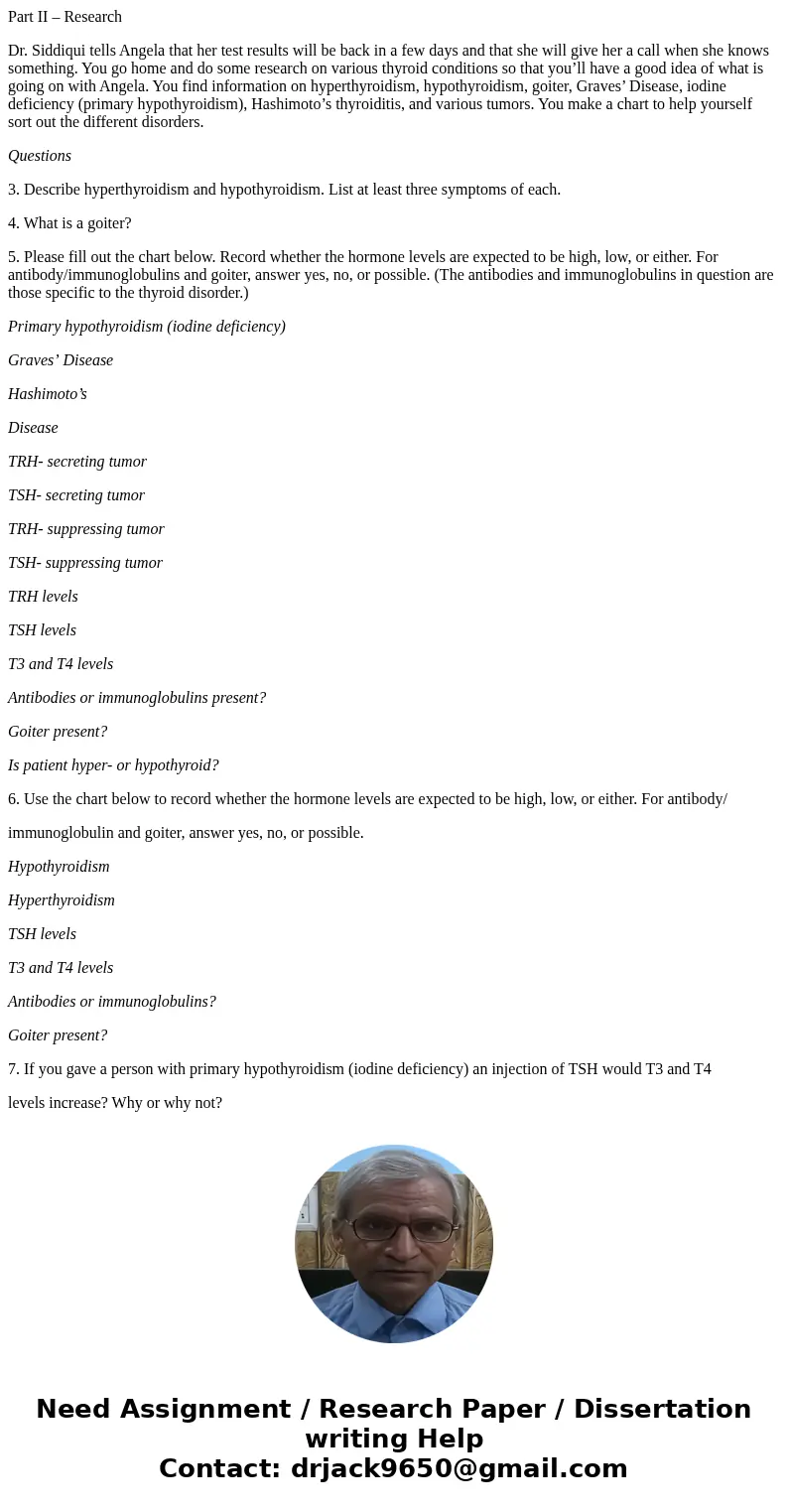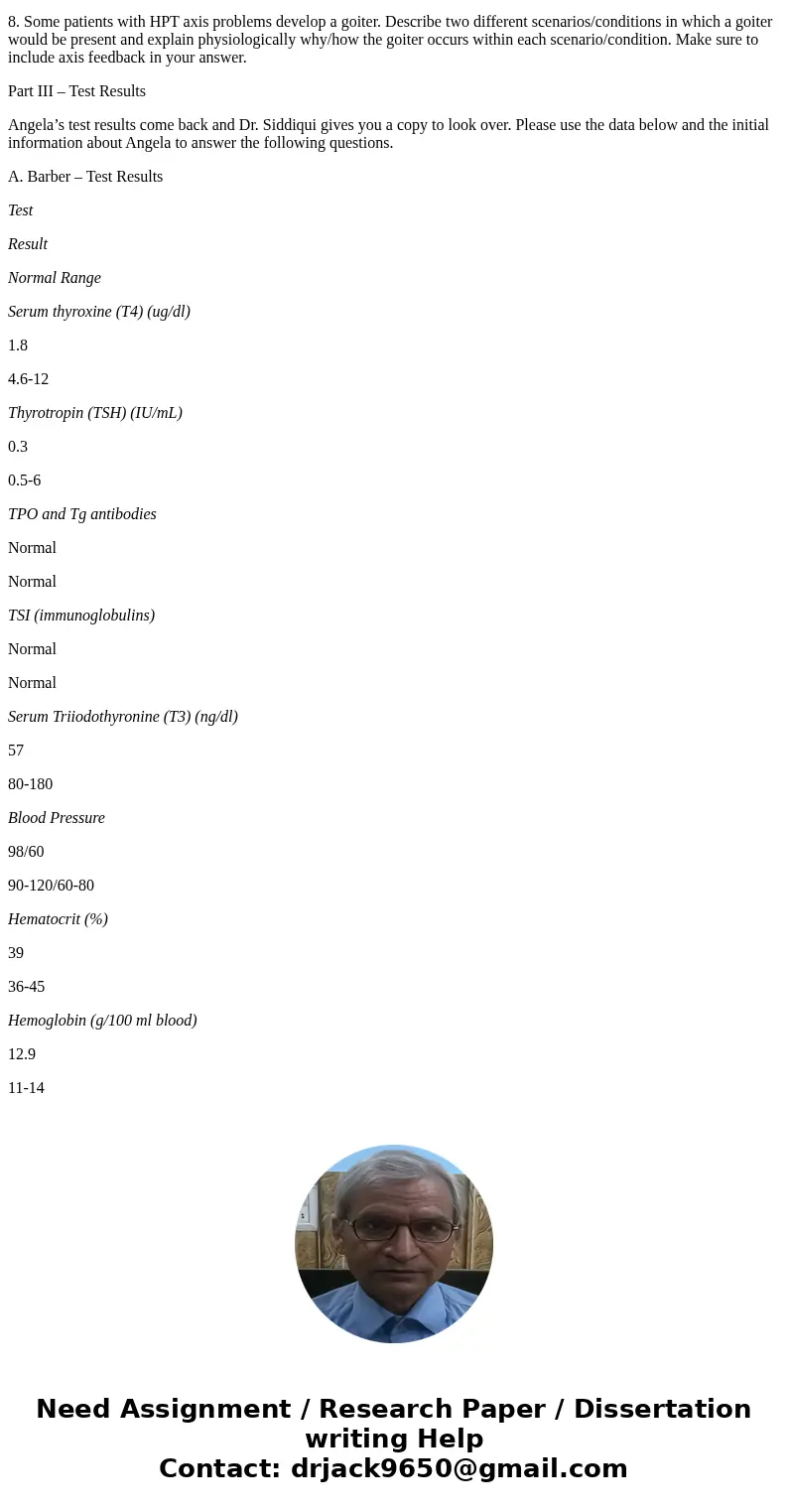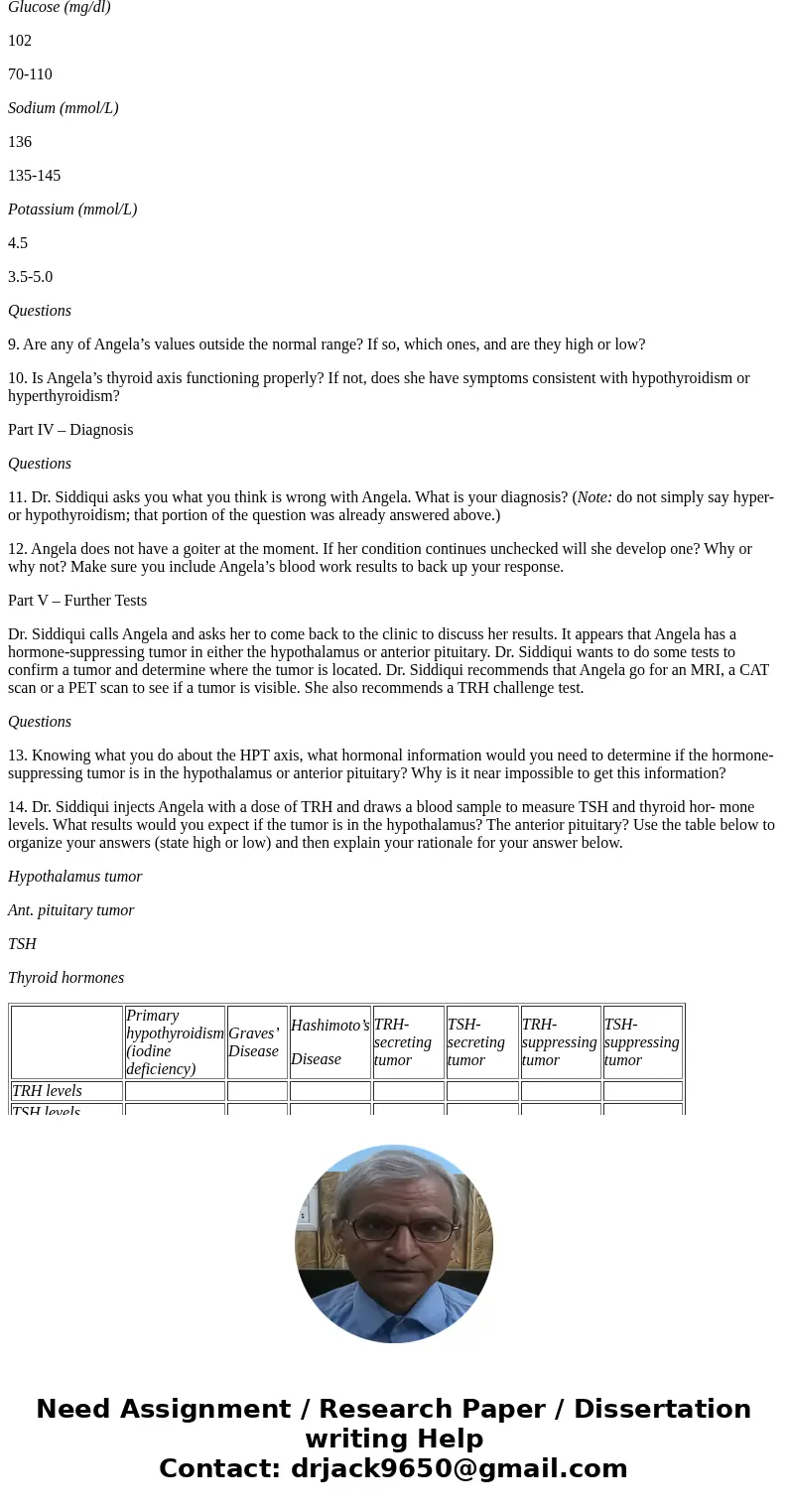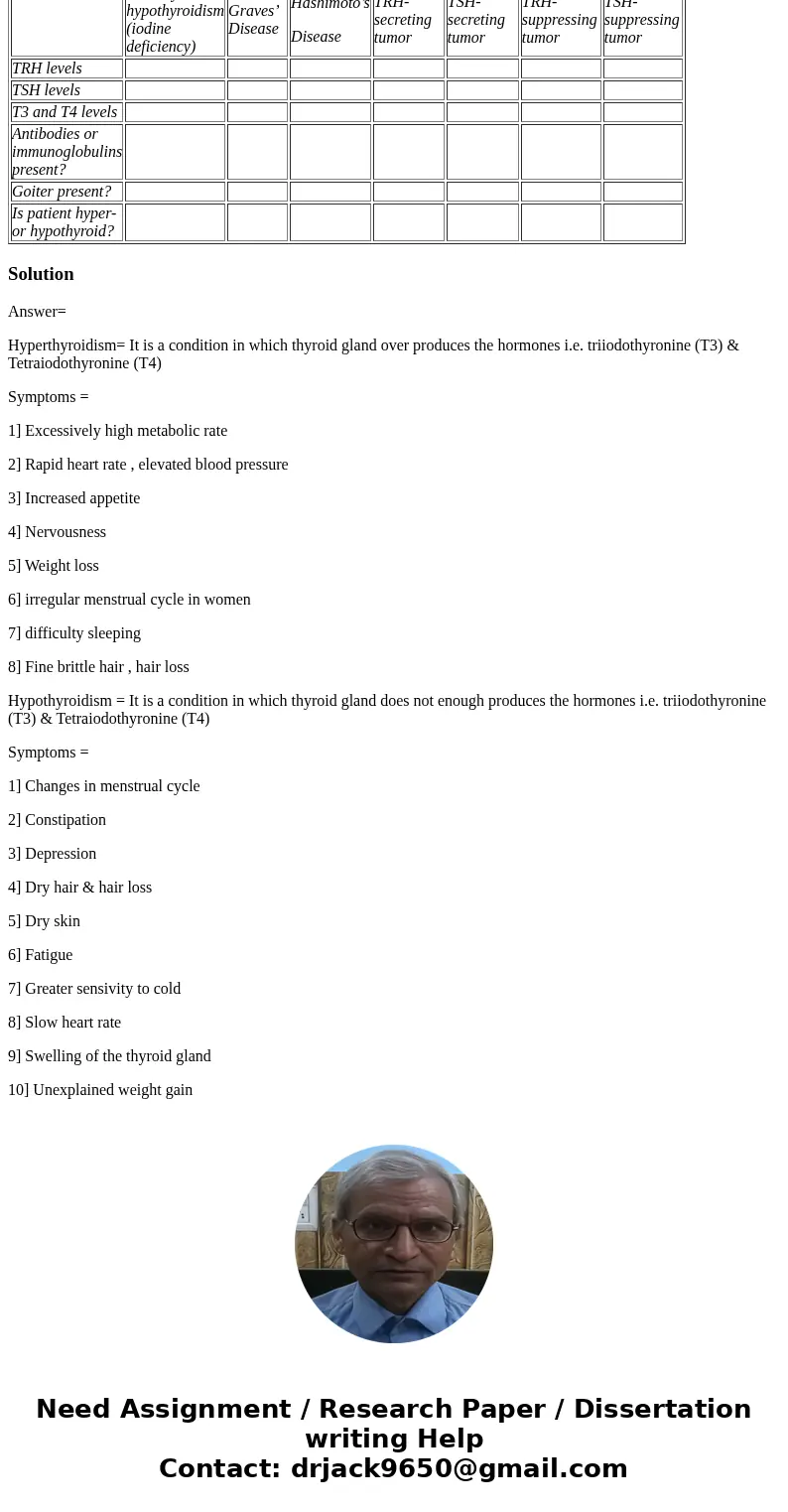Part II Research Dr Siddiqui tells Angela that her test res
Part II – Research
Dr. Siddiqui tells Angela that her test results will be back in a few days and that she will give her a call when she knows something. You go home and do some research on various thyroid conditions so that you’ll have a good idea of what is going on with Angela. You find information on hyperthyroidism, hypothyroidism, goiter, Graves’ Disease, iodine deficiency (primary hypothyroidism), Hashimoto’s thyroiditis, and various tumors. You make a chart to help yourself sort out the different disorders.
Questions
3. Describe hyperthyroidism and hypothyroidism. List at least three symptoms of each.
4. What is a goiter?
5. Please fill out the chart below. Record whether the hormone levels are expected to be high, low, or either. For antibody/immunoglobulins and goiter, answer yes, no, or possible. (The antibodies and immunoglobulins in question are those specific to the thyroid disorder.)
Primary hypothyroidism (iodine deficiency)
Graves’ Disease
Hashimoto’s
Disease
TRH- secreting tumor
TSH- secreting tumor
TRH- suppressing tumor
TSH- suppressing tumor
TRH levels
TSH levels
T3 and T4 levels
Antibodies or immunoglobulins present?
Goiter present?
Is patient hyper- or hypothyroid?
6. Use the chart below to record whether the hormone levels are expected to be high, low, or either. For antibody/
immunoglobulin and goiter, answer yes, no, or possible.
Hypothyroidism
Hyperthyroidism
TSH levels
T3 and T4 levels
Antibodies or immunoglobulins?
Goiter present?
7. If you gave a person with primary hypothyroidism (iodine deficiency) an injection of TSH would T3 and T4
levels increase? Why or why not?
8. Some patients with HPT axis problems develop a goiter. Describe two different scenarios/conditions in which a goiter would be present and explain physiologically why/how the goiter occurs within each scenario/condition. Make sure to include axis feedback in your answer.
Part III – Test Results
Angela’s test results come back and Dr. Siddiqui gives you a copy to look over. Please use the data below and the initial information about Angela to answer the following questions.
A. Barber – Test Results
Test
Result
Normal Range
Serum thyroxine (T4) (ug/dl)
1.8
4.6-12
Thyrotropin (TSH) (IU/mL)
0.3
0.5-6
TPO and Tg antibodies
Normal
Normal
TSI (immunoglobulins)
Normal
Normal
Serum Triiodothyronine (T3) (ng/dl)
57
80-180
Blood Pressure
98/60
90-120/60-80
Hematocrit (%)
39
36-45
Hemoglobin (g/100 ml blood)
12.9
11-14
Glucose (mg/dl)
102
70-110
Sodium (mmol/L)
136
135-145
Potassium (mmol/L)
4.5
3.5-5.0
Questions
9. Are any of Angela’s values outside the normal range? If so, which ones, and are they high or low?
10. Is Angela’s thyroid axis functioning properly? If not, does she have symptoms consistent with hypothyroidism or hyperthyroidism?
Part IV – Diagnosis
Questions
11. Dr. Siddiqui asks you what you think is wrong with Angela. What is your diagnosis? (Note: do not simply say hyper- or hypothyroidism; that portion of the question was already answered above.)
12. Angela does not have a goiter at the moment. If her condition continues unchecked will she develop one? Why or why not? Make sure you include Angela’s blood work results to back up your response.
Part V – Further Tests
Dr. Siddiqui calls Angela and asks her to come back to the clinic to discuss her results. It appears that Angela has a hormone-suppressing tumor in either the hypothalamus or anterior pituitary. Dr. Siddiqui wants to do some tests to confirm a tumor and determine where the tumor is located. Dr. Siddiqui recommends that Angela go for an MRI, a CAT scan or a PET scan to see if a tumor is visible. She also recommends a TRH challenge test.
Questions
13. Knowing what you do about the HPT axis, what hormonal information would you need to determine if the hormone-suppressing tumor is in the hypothalamus or anterior pituitary? Why is it near impossible to get this information?
14. Dr. Siddiqui injects Angela with a dose of TRH and draws a blood sample to measure TSH and thyroid hor- mone levels. What results would you expect if the tumor is in the hypothalamus? The anterior pituitary? Use the table below to organize your answers (state high or low) and then explain your rationale for your answer below.
Hypothalamus tumor
Ant. pituitary tumor
TSH
Thyroid hormones
| Primary hypothyroidism (iodine deficiency) | Graves’ Disease | Hashimoto’s Disease | TRH- secreting tumor | TSH- secreting tumor | TRH- suppressing tumor | TSH- suppressing tumor | |
| TRH levels | |||||||
| TSH levels | |||||||
| T3 and T4 levels | |||||||
| Antibodies or immunoglobulins present? | |||||||
| Goiter present? | |||||||
| Is patient hyper- or hypothyroid? |
Solution
Answer=
Hyperthyroidism= It is a condition in which thyroid gland over produces the hormones i.e. triiodothyronine (T3) & Tetraiodothyronine (T4)
Symptoms =
1] Excessively high metabolic rate
2] Rapid heart rate , elevated blood pressure
3] Increased appetite
4] Nervousness
5] Weight loss
6] irregular menstrual cycle in women
7] difficulty sleeping
8] Fine brittle hair , hair loss
Hypothyroidism = It is a condition in which thyroid gland does not enough produces the hormones i.e. triiodothyronine (T3) & Tetraiodothyronine (T4)
Symptoms =
1] Changes in menstrual cycle
2] Constipation
3] Depression
4] Dry hair & hair loss
5] Dry skin
6] Fatigue
7] Greater sensivity to cold
8] Slow heart rate
9] Swelling of the thyroid gland
10] Unexplained weight gain




 Homework Sourse
Homework Sourse